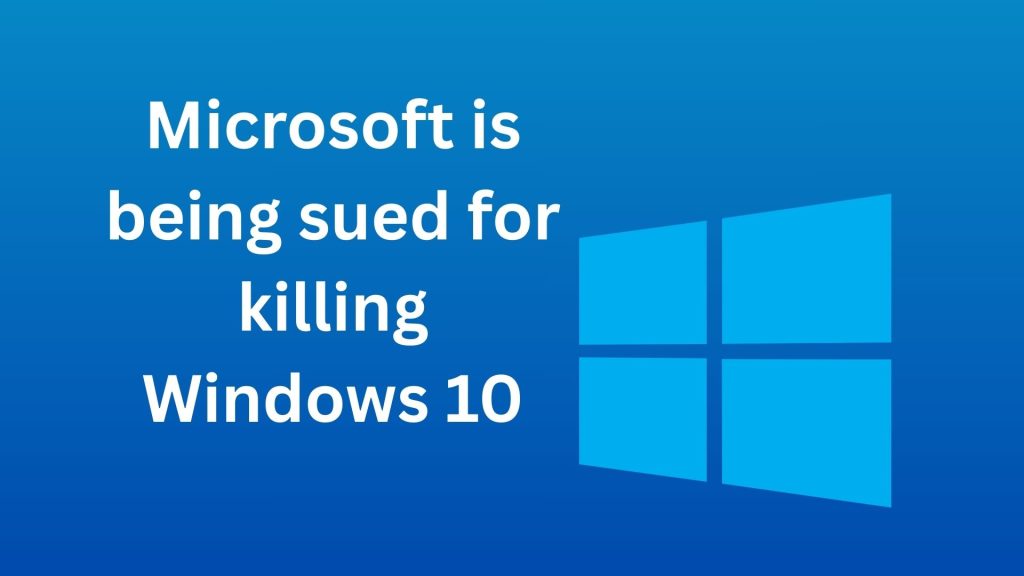Microsoft is being sued for killing Windows 10. Here are 5 reasons why the lawsuit could potentially force them to prolong support beyond. Everything you need to know will make you helpful.
4 min read
A recent lawsuit has been filed against Microsoft, accusing the tech giant of “killing” Windows 10 by ending its support prematurely. The lawsuit claims that Microsoft’s decision to discontinue support for Windows 10 will cause significant harm to users and businesses that rely on the operating system. In this article, we’ll explore the details of the lawsuit and five reasons why it could potentially force Microsoft to prolong support for Windows 10 beyond its scheduled end-of-life date.
The Lawsuit: A Brief Overview The lawsuit, filed by a group of Windows 10 users and businesses, alleges that Microsoft’s decision to end support for Windows 10 is unfair and deceptive. The plaintiffs claim that Microsoft’s actions will cause them to incur significant costs and losses, as they will be forced to upgrade to newer versions of Windows or risk security vulnerabilities by continuing to use an unsupported operating system.
5 Reasons Why the Lawsuit Could Force Microsoft to Reconsider
1. Financial Implications Microsoft’s decision to end support for Windows 10 could have significant financial implications for the company. If the lawsuit is successful, Microsoft could be forced to pay damages to affected users and businesses. Additionally, prolonging support for Windows 10 could provide Microsoft with a revenue stream through extended support contracts. |
*Potential Revenue Streams*
Extended Support Contracts | Microsoft could offer extended support contracts to users and businesses, providing them with continued security updates, bug fixes, and technical support. | | Upgrade Incentives | Microsoft could offer incentives to users and businesses to upgrade to newer versions of Windows, such as discounts or preferential pricing. |
2. User Trust and Loyalty
The lawsuit could damage Microsoft’s reputation and erode user trust and loyalty. If Microsoft is seen as abandoning its users by ending support for Windows 10 prematurely, it could harm the company’s brand and make it harder to attract new customers.
– User Trust: Users expect Microsoft to provide support for its products for a reasonable period.
– Loyalty: Users who feel abandoned by Microsoft may be more likely to switch to alternative operating systems.

3. Security Concerns
Ending support for Windows 10 could expose users to security vulnerabilities, as they will no longer receive security updates or patches. This could lead to a significant increase in malware attacks, data breaches, and other cyber threats.
– Security Risks: Without security updates, Windows 10 users will be more vulnerable to malware and other cyber threats.
– Data Protection: Users may be at risk of data breaches and other security incidents.
4. Business Impact The lawsuit could have a significant impact on businesses that rely on Windows 10. If Microsoft is forced to prolong support for Windows 10, it could help businesses avoid the costs and disruptions associated with upgrading to newer versions of Windows.
*Business Impact* | Upgrade Costs | Businesses may need to invest significant time and resources in upgrading to newer versions of Windows. | | Productivity Loss | The upgrade process could disrupt business operations, leading to productivity losses and decreased revenue. |
5. Regulatory Implications
The lawsuit could have regulatory implications for Microsoft, particularly in the European Union, where regulators have been cracking down on tech companies that engage in unfair or deceptive practices.
– Regulatory Scrutiny: Microsoft’s decision to end support for Windows 10 could be seen as unfair or deceptive, leading to regulatory scrutiny.
– Compliance: Microsoft may need to comply with regulatory requirements, such as providing extended support for Windows 10.
Conclusion
The lawsuit against Microsoft could potentially force the company to prolong support for Windows 10 beyond its scheduled end-of-life date. While Microsoft has not commented on the lawsuit, it’s clear that the company will face significant pressure to reconsider its decision to end support for Windows 10. As the lawsuit makes its way through the courts, we’ll be watching to see how Microsoft responds and what implications it has for the tech industry as a whole.
What to Expect Next The lawsuit is expected to proceed through the courts, with Microsoft likely to file a response to the allegations. The plaintiffs may seek a preliminary injunction to force Microsoft to continue supporting Windows 10 until the lawsuit is resolved. As the case progresses, we can expect to see more details about Microsoft’s decision-making process and the potential implications for users and businesses.
TL;DR A lawsuit has been filed against Microsoft over its decision to end support for Windows 10. The lawsuit claims that Microsoft’s actions will cause significant harm to users and businesses. Five reasons why the lawsuit could force Microsoft to reconsider include financial implications, user trust and loyalty, security concerns, business impact, and regulatory implications. As the lawsuit proceeds, we’ll be watching to see how Microsoft responds and what implications it has for the tech industry.








